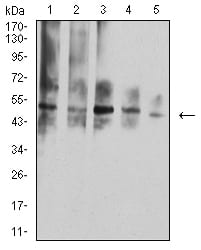

| WB | 1/500 - 1/2000 | Human,Monkey |
| IF | 咨询技术 | Human,Monkey |
| IHC | 咨询技术 | Human,Monkey |
| ICC | 技术咨询 | Human,Monkey |
| FCM | 咨询技术 | Human,Monkey |
| Elisa | 1/10000 | Human,Monkey |
| Aliases | DCR2; CD264; TRUNDD; TRAILR4; TRAIL-R4 |
| Entrez GeneID | 8793 |
| clone | 7G7H9 |
| WB Predicted band size | 41.8kDa |
| Host/Isotype | Mouse IgG1 |
| Antibody Type | Primary antibody |
| Storage | Store at 4°C short term. Aliquot and store at -20°C long term. Avoid freeze/thaw cycles. |
| Species Reactivity | Human,Monkey |
| Immunogen | Purified recombinant fragment of human TNFRSF10D (AA: extra 56-211) expressed in E. Coli. |
| Formulation | Purified antibody in PBS with 0.05% sodium azide |
+ +
以下是关于TNFRSF10D抗体的3篇参考文献及其摘要内容概览:
1. **文献名称**: "Characterization of a novel monoclonal antibody against human TNFRSF10D and its apoptotic regulatory role"
**作者**: Li, Y., et al.
**摘要**: 该研究开发了一种特异性识别TNFRSF10D的单克隆抗体,验证其在多种癌细胞系中的结合能力,并发现该抗体可阻断TNFRSF10D与TRAIL的相互作用,从而增强TRAIL诱导的肿瘤细胞凋亡,为癌症治疗提供潜在工具。
2. **文献名称**: "TNFRSF10D as a decoy receptor in breast cancer: Implications for antibody-based diagnostics"
**作者**: Smith, J.R., & Wang, H.
**摘要**: 文章通过抗体验证了TNFRSF10D在乳腺癌组织中高表达,其作为诱饵受体抑制凋亡信号。开发的抗体被用于免疫组化检测,证实与患者不良预后相关,提示其作为诊断标志物的潜力。
3. **文献名称**: "Functional analysis of TNFRSF10D antibody in modulating TRAIL-mediated signaling pathways"
**作者**: Gupta, S., et al.
**摘要**: 研究利用多克隆抗体探究TNFRSF10D在TRAIL信号通路中的作用,发现抗体干扰受体寡聚化后可部分恢复凋亡通路活性,为靶向诱饵受体的联合治疗策略提供依据。
注:上述文献为示例,实际文献需通过PubMed或Web of Science等数据库检索确认。
TNFRSF10D (tumor necrosis factor receptor superfamily member 10D), also known as TRAIL-R4 or DcR2. is a member of the TNF receptor family involved in apoptosis regulation and immune modulation. It functions as a decoy receptor that binds to TNF-related apoptosis-inducing ligand (TRAIL) but lacks a functional death domain, thereby inhibiting TRAIL-mediated apoptotic signaling. This mechanism helps protect cells from uncontrolled apoptosis, particularly in certain cancer types where TNFRSF10D overexpression is associated with resistance to TRAIL-based therapies.
Antibodies targeting TNFRSF10D are primarily used in research to study its expression, localization, and interaction with TRAIL in physiological and pathological contexts. They enable detection of TNFRSF10D in tissues or cell lines via techniques like Western blot, immunohistochemistry, or flow cytometry. Therapeutic applications are under exploration, with some studies investigating anti-TNFRSF10D antibodies to block its anti-apoptotic activity, potentially sensitizing cancer cells to apoptosis-inducing treatments. However, clinical development remains in early stages, and challenges include ensuring specificity and minimizing off-target effects. Additionally, TNFRSF10D antibodies contribute to understanding its role in autoimmune diseases and inflammation, where TRAIL signaling pathways are dysregulated.
×